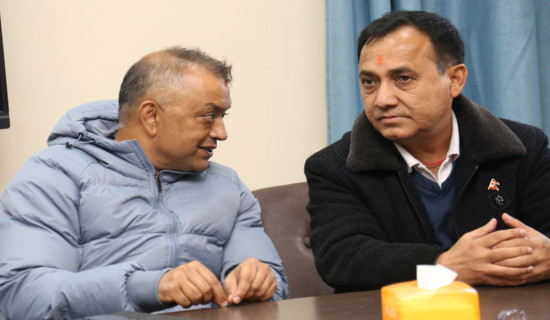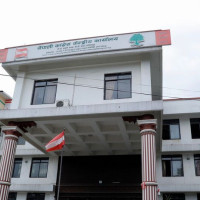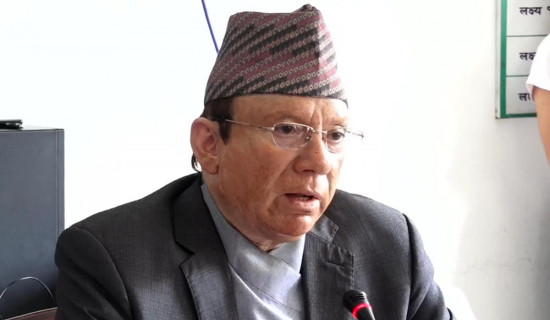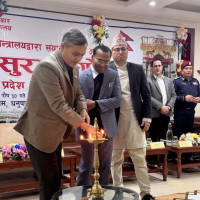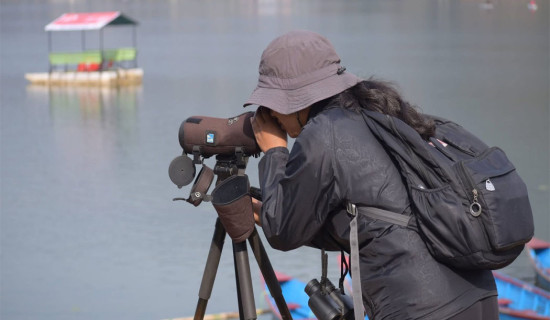- Wednesday, 14 January 2026
Sharmila Lama: Overcoming adversity with resilience
Kathmandu, Aug. 4: At only 32, Sharmila Lama has climbed more than a dozen mountain peaks, including four 8,000ers. A single mother to a beautiful eight-year-old boy, she runs a successful café in Bouddha, Kathmandu. She is active in empowering women, especially those from the Tamang community like her.
By any standard, Sharmila is an accomplished individual. But her journey getting here was all but easy. To say that life threw challenges her way would be an understatement. She had to endure domestic violence, fight depression and overcome prejudices. But, in the end, she triumphed and is today, as her peers say, an inspiration.
Born in a farming family in Bhimkhori, Kavrepalanchowk, as the second of five siblings, Sharmila was always intrigued by the world around her. Even in school, she found activities beyond the classroom more interesting than lessons confined to her books.
Her family had no problem with that but the society did.
“Daughters were no different from sons in our house but, unfortunately, that was not the case in the village,” Sharmila shared. “A girl who was not meek and was active in extra-curriculars was an outrage for many.”
“On top of that, I was chubby. Some teachers would complain that my breasts moved when playing sports.”
But Sharmila was not deterred. Her strong will and hunger for exploration were too great for anyone – even her – to contain. That is why, without any knowledge, preparation or forethought, she ended up ascending her first peak at the young age of 17.
“It was almost on a whim,” she recounted. “My cousin and I were on a trek to Gosaikunda when we met a Gurung guide. He asked if we wanted to climb the Surya Peak and we said okay. We ended up scaling the peak just like that,” Sharmila chuckled. She was in the 11th grade then.
Surya Peak is a 5,145-metre mountain just above the holy Gosaikunda lake.
After graduating high school, Sharmila came to Kathmandu and her interests took a back seat. She had to find a footing in the bustling capital and sustain herself. In 2013, she got married after which, in her words, life took a turn for the worse.
“A couple of years after marriage, I got pregnant and had my son.
“Up until that point, I had always been self-sufficient but after my baby, I became reliant on my husband for finances.” And this reliance brought with it pain.
Sharmila’s husband became abusive. She was subjected to violence. After only three months of her child’s birth, he tried to force her to go to Iraq. Later, she found out that it was because he stood to gain US$ 1,000 from it. Yet, she tolerated everything.
Because she had married a Sherpa man, who was from outside her Tamang ethnicity, her family was not happy. So, she felt she did not have anyone to turn to. She suffered alone and tried to compromise; tried to survive the darkness.
But things only got worse, pushing Sharmila into depression.
“The near-constant physical and psychological torture made me contemplate suicide,” she said, taking a pause.
Sharmila was at the cusp staring into an inviting abyss that promised release from life’s agony. But, thankfully, she stepped back, for herself and her infant. She found her strong will again.
With the help of her mother and family, she opened a tea shop near her home. Her husband was out of the picture by this time.
The tea shop proved to be the match that re-ignited her passion for exploration and in 2017, as part of a women’s team, she successfully climbed Mount Ramdung of Dolakha. This expedition was extensively covered by the media because it was led by the first Tamang female Everest summiteer Kanchhi Maya Tamang.
One would think such a success would bring Sharmila a legion of fans. But no. “Women constantly have to prove themselves,” she expressed.
“I was still discouraged. People would call me fat or say that someone who has had a baby would not be fit enough to climb. “Some would flat out say that I would die.” But Sharmila did not let such remarks dissuade her. In 2018, she made her first attempt on Mount Everest and, despite reaching tantalisingly close to the summit, could not make it to the top.
“There’s power in failure, though,” she said, not considering her first attempt on the world’s tallest mountain a wasted effort. “The unsuccessful endeavour energised me and strengthened my resolve.”
This renewed vigour gave Sharmila three huge successes in 2019. She stepped on the top of the world, Mount Everest, in May; conquered the highest point in Europe, Mount Elbrus, in August and defeated the killer mountain, Mount Manaslu, in September. In 2021, during the COVID-19-induced national lockdown, she summited Annapurna I.
Sharmila hopes to climb all 14 mountains of the world over 8,000 metres tall to show others that they can too and to carve a space for women, especially Tamang women, to achieve their dreams.
This desire has driven her to social activism, in addition to mountaineering. She has used her café, which she started after the COVID-19 lockdown, to train 19 young girls to be Baristas. She did so with her own money and the money she received from the Tenzing-Hillary Award the Department of Tourism presented her in 2021. “I want women to be independent and to not have to look to anyone for finances or anything else.”
True to this aim, Sharmila has prioritised the hiring of women in her bistro. Sharmila was also one of the winners of the Everest Action Climate Award 2023. She credits her father with inspiring her and orienting her towards the mountains. He used to work as a seasonal tourist guide until the Maoist conflict caused huge losses and forced him to quit.
Sharmila’s achievements are enviable but her life is not. She had to experience depths no one should. She acknowledges that. But she does not let that define her. “Perhaps I would have been an average person if not for those hardships,” she expresses a positive outlook.



